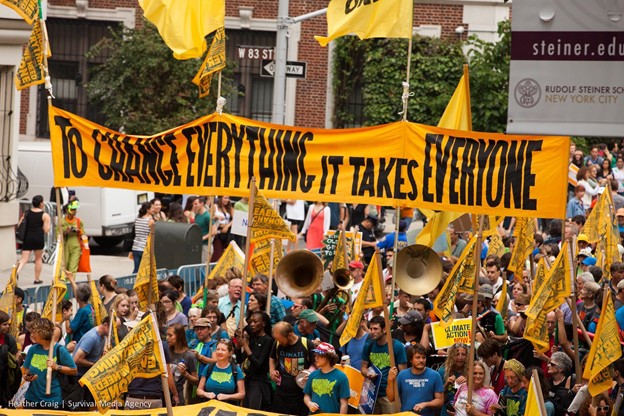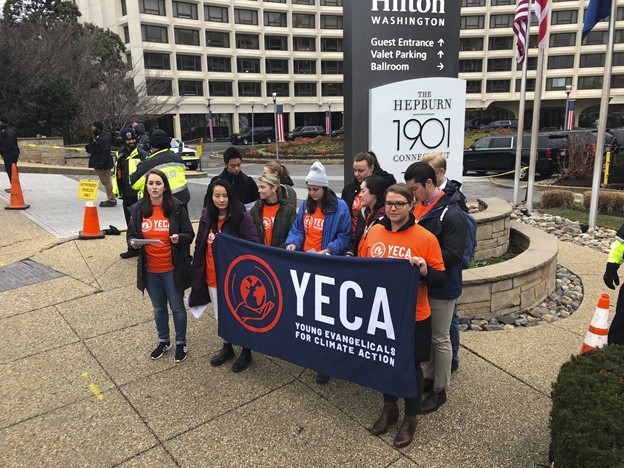Bridging The Gap: How Climate Activists Can Overcome Political Boundaries

Raise your hand if you have ever come away from an emotionally- or politically-charged argument about climate change, whether it be over Thanksgiving dinner or a Facebook comments thread. Did you feel like you had a valuable discourse or came to a mutual understanding? Why is it so difficult to talk about climate change and climate action, especially with people who think and vote differently than you?
This communication stalemate motivated us to understand climate action from different political viewpoints in the United States. Despite challenges in communicating over political divides, people across the socio-political spectrum do pursue climate change activism in many different ways.
To learn more about this, we analyzed three organizations that fill different niches in the American climate activism sphere: the American Conservation Coalition (ACC), republicEn, and 350.org. ACC is a youth-oriented conservative environmental organization geared towards providing climate solutions that align with politically conservative ideals, such as competitive clean energy markets and privately managed land conservation. It has proposed the American Climate Contract as an alternative plan to the Green New Deal to address climate change in the US. republicEn offers a “conservative answer to climate change,” and calls themselves the “EcoRight.” The organization advocates for carbon taxing as a small-government solution to hold polluters accountable for their emissions. 350.org is an international movement focused on ending our global dependency on fossil fuels and building a future of renewable energy for all. No political leaning is advertised, and leadership is diverse and decentralized. The group utilizes a variety of organizing strategies including online campaigns, grassroots organizing, and mass public actions.
Political Polarization and Psychology
In order to understand climate change activism, it is important to understand the political landscape and psychology behind climate change perception in the US. The first Earth Day, celebrated in 1970, is often considered the start of modern environmentalism in the US. At the time, protecting the environment was considered a consensual issue that reached across political party lines. However, environmental issues have since become politically polarized. According to a 2012 report released by the Pew Research Center, the gap between Republicans and Democrats on the issue of environmental protection has increased the most out of forty-eight different issues tracked by Pew in recent decades. Since 1992, partisanship over this issue has increased from only a five percentage point difference to an average of thirty-nine percentage point difference in 2012. Aaron McCright, who is known for his research on US political attitudes towards environmental and climate issues, writes that political affiliation can be “one of the most powerful predictors of environmental concern” in the US.
So what does it mean to have political affiliation be a predictor of environmental concern? How do these disparities in values develop? There is an entire branch of psychology termed moral psychology that combines ethics, psychology, and philosophy to explain how morals shape the way humans understand the world. Within this field, scientists have studied how values help humans make decisions and act. Robb Willer runs the Polarization and Social Change Lab at Stanford University. In an opinion piece for the New York Times, he writes that “we’re more likely to contribute to a cause when we feel ethically compelled to.” While this might seem obvious, tapping into someone’s moral values in a genuine way is easier said than done. To do this, we need to understand what an individual values and use language that appeals to those values.
Researchers in moral psychology have found that moral values can be a predictor of political affinity. On an episode of Science Friday, Willer discusses the findings that “Liberals care a lot about equality, fairness, protecting vulnerable people from harm, where conservatives care a lot about group loyalty, patriotism, moral purity, just sanctity. And so one way to think about this is that our divided political map is undergirded by a very divided moral map as well.” Moral psychology suggests that the way we frame an issue like climate change can affect how American liberals and conservatives react to the issue. In the same New York Times opinion piece, Willer writes that “Protection from harm is a moral concern that, past research finds, resonates significantly more with American liberals than conservatives. By contrast, moral concerns more unique to conservatives like patriotism, respect for authority, sanctity or purity rarely appeared in the environmental appeals we studied.”
“[The best way to talk about climate change is to] start by talking about why it matters to us, to begin with genuinely shared values.” – Katharine Hayhoe
Willer was writing based on his own research findings, which showed that when pro-environmental ideas were framed in terms of purity, conservatives were more likely to adopt pro-environmental attitudes. For example, framing environmental clean up as purifying a polluted environment resonated more with self-identified conservatives. Other research has been conducted on the use of religion to engage Christians in climate change. Christian climate scientist Katharine Hayhoe is proof that successful engagement is possible. In an interview on the podcast How to Save a Planet, Hayhoe shares how she has been talking about climate change with fellow Christians. Hayhoe uses passages from the Bible and the theology of Creation Care to explain that taking climate action is inherently Christian. In her experience, the people that she talks to are receptive to this approach because she begins with something that they all agree on. In her TED talk, Hayhoe says that the best way to talk about climate change is to “start by talking about why it matters to us, to begin with genuinely shared values.” For example, both liberal and conservative parents might care about the state of the world their children will live in, and can find common ground in making the world a healthier place for future generations.

Thematic Analysis of Climate Change Organizations
To further explore how these findings appear in the work of climate change organizations, we conducted a qualitative, thematic analysis. We researched the three previously mentioned climate change organizations (ACC, republicEN, and 350.org) and identified, analyzed, and discerned meaningful themes from each organization’s website. We found that Willer, Hayhoe, and McCright’s insights on American values and environmental attitudes were evident in our analysis.

It is important to note that we did not investigate whether one organization is superior or more effective than the others. Our research highlights that each organization has its own niche in society and uses different strategies to bring the conversation on climate change to different target audiences.
For both republicEn and ACC, we found that political identity and leadership were the main themes used to encourage climate change activism. republicEn members identify as the EcoRight, a term suggested by the organization to “balance the Environmental Left.” On their website, republicEn claims that their conservative values are the “key to effective climate change solutions.” Throughout our research, this was the most explicit acknowledgement of the politically polarized landscape of climate change activism. Our analysis of ACC found that the majority of members were conservative millennials with backgrounds in political science and business, and this demographic is the target audience for new members. Another important recruitment point for ACC is the opportunity to gain a leadership role. The ACC and republicEn are perfect examples of Willer’s evaluation of conservative values; both groups are loyal to their group identities, to authority figures, and to the larger Republican political party.
While 350.org is not a politically-focused organization, their goals, diversity, and priorities align with Willer’s descriptions of liberal values. It makes sense that republicEn and ACC stand in stark contrast to 350.org, which does not highlight a specific identity to rally around, and instead pushes for “a just, prosperous, and equitable world built with the power of ordinary people.” Accessibility and inclusion and global vision emerged as primary themes developed for 350.org. The website makes activism accessible and inclusive by providing eight language translations, acknowledges social barriers to activism by highlighting how to organize around COVID-19, and provides free activist training materials. The themes for 350.org align with the values of fairness and equity, which tend to appeal more to liberals rather than conservatives.
“It is critical to create safe spaces for conversations about climate change that resonate with a wide variety of people, because climate change action needs a diversity of perspectives to be effective.”
It is critical to create safe spaces for conversations about climate change that resonate with a wide variety of people, because climate change action needs a diversity of perspectives to be effective. republicEn and ACC are important because they engage with a broader audience that may feel left out of the liberal framing of environmental and climate change movements. Furthermore, it makes sense that Hayhoe’s work in framing climate change activism as Creation Care is successful, seeing as many members of republicEn are climate change activists because of their Christianity. She has found a way to bond with people who share her core beliefs, and motivating those who otherwise might never have found motivation to act on climate change. Conservative climate activists are uniquely positioned within communities that often do not engage in conversations about climate change. Our research was a preliminary step in expanding our understanding of how people value our shared Earth, and what moral lens encourages them to pursue activism.

Authors’ Personal Reflections
After conducting this research, we each spent some time reflecting on what this means to us and our future work in this area.
“This research project helped me reevaluate my place in the climate change movement, and pushed me to expand my social boundaries beyond those who think and act like me. In my future, I want to help strengthen diverse social networks through common ground, and use that common ground to encourage climate change action. While it is easy to criticize differing narratives and approaches to climate change action, there is value in looking at an issue from all perspectives; our current state of affairs in the U.S. show how harmful political partisanship and cultural polarization can be.” – Kathryn
“Understanding how people make value judgments can be a powerful tool, especially when we need to work across the political aisle on contentious issues, like climate change. Knowing that there is a way to connect with people on climate change, even when it feels like such a politically polarizing topic, gives me hope that we can work together to solve this issue. This research has helped me see a clearer path for how we can move past political differences and move towards a better future.” – Leslie
Authors’ notes:
This article was inspired by a group research project conducted by the authors and three other SMEA students (Jessica Rose, Ivana Suradja, and Philip Taylor) in one of the core courses of the Master in Marine Affairs.
Contact Currents’ Editor-in-Chief for access to:
Feinberg, M., & Willer, R. (2013). The Moral Roots of Environmental Attitudes. Psychological Science, 24(1), 56–62. https://doi.org/10.1177/0956797612449177
Goldberg, M. H., Gustafson, A., Ballew, M. T., Rosenthal, S. A., & Leiserowitz, A. (2019). A Social Identity Approach to Engaging Christians in the Issue of Climate Change. Science Communication, 41(4), 442–463. https://doi.org/10.1177/1075547019860847
McCright, A. M., Xiao, C., & Dunlap, R. E. (2014). Political polarization on support for government spending on environmental protection in the USA, 1974–2012. Social Science Research, 48, 251–260. https://doi.org/10.1016/j.ssresearch.2014.06.008
Webber, D. J. (2008). Earth Day and Its Precursors: Continuity and Change in the Evolution of Midtwentieth-Century U.S. Environmental Policy. Review of Policy Research, 25(4), 313–332. https://doi.org/10.1111/j.1541-1338.2008.00334.x